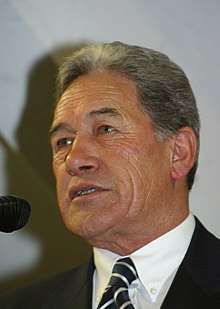Populism in New Zealand
During the 1990s New Zealand saw a growth in populism,[1] a political movement that claims to work for the "people" rather than for the "1%" or for the "elite". The rise of populism in the country has been attributed to the introduction of the mixed-member proportional electoral system, as well as to the populist nature of election campaigns, such as that of the Labour Party in the lead-up to the 1999 election. The New Zealand First party, which has historically taken a nationalist standpoint, is categorised as a populist party.[1][2][3][4]
History
Robert Muldoon, the 31st Prime Minister of New Zealand from 1975 to 1984, had been cited as a populist leader who appealed to the common man and utilised a personality-driven campaign in the 1975 election.[5]

Populism has become a pervasive trend in New Zealand politics since the introduction of the mixed-member proportional voting system in 1996.[6][7] The New Zealand Labour Party's populist appeals in its 1999 election campaign and advertising helped to propel the party to victory in that election.[8] Labour also articulated populism in its 2002 election campaign, helping return the party to government, despise its being entrenched as part of the establishment under attack by other parties employing strongly populist strategies, drawing on their outsider status. Those parties—New Zealand First and United Future—benefited greatly in 2002 from running almost textbook populist advertising campaigns, which helped both parties increase their proportion of the party vote to levels unanticipated at the commencement of the election campaign.[8] The New Zealand National Party made limited attempts at articulating populism in its advertising, but suffered from the legacy of being part of the 1990s establishment.[8]
In preparation for the 2005 election, then-leader of the National Party Don Brash delivered the Orewa Speech in 2004 on allegations of Māori privilege. This speech has been labelled populist due to the polling beforehand which had revealed to the National Party that the topic of race relations was sensitive enough to sway voters, and its perceived intent to exploit long-held grievances in society.[9] The success in the polls granted to the National Party by this speech led to the delivery of a speech dubbed "Orewa 2" the next year, this time on welfare dependency. This second attempt at a populist speech was less successful as voters perceived it as such.[10]
Modern politics
New Zealand First has presented a more lasting populist platform. Long-time party leader Winston Peters has been characterised by some as a populist who uses anti-establishment rhetoric,[11] though in a uniquely New Zealand style.[12][13] New Zealand First takes a centrist approach to economic issues,[6] typical of populist parties, while advocating conservative positions on social issues.[14] Political commentators dispute the party's classification on the ideological spectrum, but state that its dominant attribute is populism.[15] The party's strong opposition to immigration, and policies that reflect that position, as well as its support for multiple popular referenda, all typify its broadly populist approach. Peters has been criticised for reputedly inciting anti-immigration sentiment[12] and capitalising on immigration fears—he has highlighted the threat of immigration in both economic and cultural terms.[16] Some academics, such as Ruth Wodak, contend that New Zealand First uses right-wing populist rhetoric,[2] in common with parties such as UKIP in Britain.[11]
References
- Mudde, Cas; Kaltwasser, Cristóbal Rovira (2017). Populism: A Very Short Introduction. Oxford: Oxford University Press. p. 38. ISBN 9780190234874.
The region with the clearest populist tradition is Australasia, more specifically Australia and New Zealand. Both countries have seen the rise of right-wing populist parties in the 1990s … New Zealand First (NZF) and One Nation (ONP) emrged out of a growing frustration with increased immigration and with neoliberal welfare state reforms.
- Wodak, Ruth, ed. (2012). Right-Wing Populism in Europe: Politics and Discourse (1st ed.). London: Bloomsbury Academic. p. 23. ISBN 978-1780932453.
- Betz, Hans-Georg; Immerfall, Stefan, eds. (1998). "New Zealand First". The New Politics of the Right: Neo-populist Parties and Movements in Established Democracies. St Martin's Press.
- Boston, Jonathan (2003). New Zealand Votes: The General Election of 2002. Victoria University Press. p. 240. ISBN 9780864734686.
- Cowen, Tyler (13 February 2017). "Feisty, Protectionist Populism? New Zealand Tried That". Bloomberg L.P. Archived from the original on 1 March 2017. Retrieved 18 June 2017.
- Mazzoleni, Juliet Roper; Christina Holtz-Bacha; Gianpietro (2004). The politics of representation : election campaigning and proportional representation. New York: Lang. p. 40. ISBN 9780820461489.
- Carmichael, Kelly (21 March 2016). "Proportional Representation leads to right-wing populism? Really?". National Observer. Archived from the original on 20 September 2017. Retrieved 17 June 2017.
- Boston, Jonathan (2003). New Zealand Votes: The General Election of 2002. Victoria University Press. pp. 239–40. ISBN 9780864734686. Archived from the original on 2 November 2017.
- Johansson, Jon (2 May 2017). "Orewa and the Rhetoric of Illusion". Political Science. 56:2 (2): 111–29. doi:10.1177/003231870405600212.
- Hager, Nicky (2006). The Hollow Men. Craig Potton Publishing. p. 115. ISBN 978-1877333620.
- Moore, John (11 November 2016). "Political Roundup: Could anti-Establishment politics hit New Zealand?". The New Zealand Herald. Retrieved 16 June 2017.
- Landis, Dan; Albert, Rosita D. (2012). Handbook of Ethnic Conflict: International Perspectives. Springer Science & Business Media. p. 52. ISBN 9781461404484. Archived from the original on 2 November 2017.
- Trotter, Chris (14 February 2017). "Chris Trotter: Winston Peters may be a populist but that does not make him NZ's Trump". Stuff.co.nz. Retrieved 16 June 2017.
- Hayward, Janine; Shaw, Richard (2016). Historical Dictionary of New Zealand. Rowman & Littlefield. p. 221. ISBN 9781442274396. Archived from the original on 2 November 2017.
- Bale, Tim; Blomgren, Magnus (2008), "Close but no cigar?: Newly governing and nearly governing parties in Sweden and New Zealand", New Parties in Government, Routledge, p. 94, ISBN 9780415404990
- Liu, James H.; Mills, Duncan (2006). "Modern racism and neo-liberal globalization: the discourses of plausible deniability and their multiple functions". Journal of Community & Applied Social Psychology. 16 (2): 83–99. doi:10.1002/casp.847.